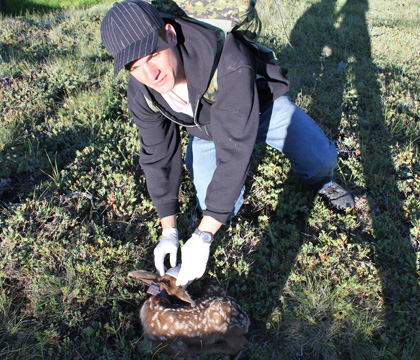
Redford studies disease trends in B.C. wildlife
From working with white sturgeon in an aquatic toxicology lab to capturing mule deer fawns for chronic wasting disease monitoring, Tony Redford had already gained valuable experience with multiple species before he began his veterinary degree in 2010.
By Robyn Thrasher
Now entering his third year at the Western College of Veterinary Medicine, Redford continues to learn more about wildlife as he takes on a research project supervised by Dr. Trent Bollinger, a WCVM associate professor and the western/northern regional director for the Canadian Cooperative Wildlife Health Centre (CCWHC).
During his summer break, Redford will analyze trends in wildlife disease in British Columbia.
"I'm reviewing and collating a number of wildlife pathology files, as well as helping to perform necropsies at B.C.'s Animal Health Centre in Abbotsford, B.C.," explains Redford.
Aiding in the identification of important wildlife disease issues, this retrospective study is part of a passive surveillance program that will have Redford generating tables, graphs and maps that summarize the occurrence of wildlife diseases in B.C. over the past three years.
The study involves a variety of areas of veterinary medicine that interest him, and Redford believes this study will have a significant impact on public health.
"Many people depend on wildlife as a source of food so diseases affecting them are very important," he explains. "As well, free-ranging wildlife are critical participants in many ecosystems, and the health of ecosystems is a necessity in maintaining the health of the environment."
Originally from Kamloops, B.C., Redford is glad to have the opportunity to work in his home province for the summer. Following graduation, he plans to return to B.C. and establish a career focusing on pathology, wildlife or fisheries.
"I'm a crazy aquarium keeper and I'm interested in any sort of fish, coral or aquatic plant."
Redford has found this summer to be a nice change from sitting in lectures all day at the veterinary college: "It's nice to get paid for learning instead of paying to learn," he jokes. "It's also been a great opportunity to have some one-on-one teaching time with my supervisors and mentors."
For Redford, working in research for the summer provides a chance to perform an in-depth exploration of questions that students often have during class. As well, one of the most intriguing parts of research for him has been investigating questions to which nobody knows the answers.
"Whether your results support or reject your initial hypothesis, there's always something to be learned."
Robyn Thrasher of Edmonton, Alta., is a third-year veterinary student at the WCVM. Robyn is a WCVM research communications intern as well as a summer student in the WCVM Veterinary Medical Centre during the summer of 2012.
During his summer break, Redford will analyze trends in wildlife disease in British Columbia.
"I'm reviewing and collating a number of wildlife pathology files, as well as helping to perform necropsies at B.C.'s Animal Health Centre in Abbotsford, B.C.," explains Redford.
Aiding in the identification of important wildlife disease issues, this retrospective study is part of a passive surveillance program that will have Redford generating tables, graphs and maps that summarize the occurrence of wildlife diseases in B.C. over the past three years.
The study involves a variety of areas of veterinary medicine that interest him, and Redford believes this study will have a significant impact on public health.
"Many people depend on wildlife as a source of food so diseases affecting them are very important," he explains. "As well, free-ranging wildlife are critical participants in many ecosystems, and the health of ecosystems is a necessity in maintaining the health of the environment."
Originally from Kamloops, B.C., Redford is glad to have the opportunity to work in his home province for the summer. Following graduation, he plans to return to B.C. and establish a career focusing on pathology, wildlife or fisheries.
"I'm a crazy aquarium keeper and I'm interested in any sort of fish, coral or aquatic plant."
Redford has found this summer to be a nice change from sitting in lectures all day at the veterinary college: "It's nice to get paid for learning instead of paying to learn," he jokes. "It's also been a great opportunity to have some one-on-one teaching time with my supervisors and mentors."
For Redford, working in research for the summer provides a chance to perform an in-depth exploration of questions that students often have during class. As well, one of the most intriguing parts of research for him has been investigating questions to which nobody knows the answers.
"Whether your results support or reject your initial hypothesis, there's always something to be learned."
Robyn Thrasher of Edmonton, Alta., is a third-year veterinary student at the WCVM. Robyn is a WCVM research communications intern as well as a summer student in the WCVM Veterinary Medical Centre during the summer of 2012.
